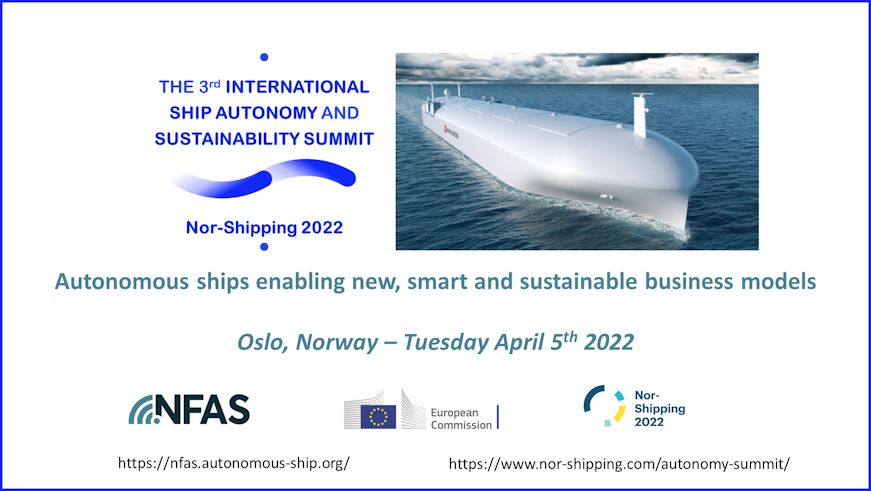

This Summit continues to investigate autonomy in shipping and provide new insights on what is really meant by MASS (Maritime Autonomous Surface Ships).
Ship autonomy is not generally a goal in itself. This summit will investigate how autonomy, and reduced or uncrewed operation can enable new types of logistics systems. These new systems can, e.g. be better integrated with ports land based transport and may improve waterborne transport's competitiveness towards road transport or be developed into other new low emission transport solutions. However, availability of technology and appropriate regulations are factors that also needs to be considered. These issues are discussed in the 3rd International Ship Autonomy and Sustainability Summit.
This event was the first physical event after Covid and was co-organised by the European Commission’s Directorate General for Mobility and Transport, Nor-Shipping, and the Norwegian Forum for Autonomous Ships (NFAS).
The full recording of the event is available on the link below.
Moderator: Ørnulf Jan Rødseth | General Manager, NFAS
Svein David Medhaug | Chair of NFAS board of directors, Norwegian Maritime Authority
Peter Eide Walseth | Political advisor, Norwegian Ministry of MO Secretary General (video message)
Adina Vălean | European Commissioner for Transport (recorded message)
Magda Kopczynska | Director of DG MOVE Waterborne
Henrik Tunfors | Chair IMO RSE: Where is IMO on MASS and what is the way forward?
Knut Arild Hareide | Director General of Navigation and
Shipping, Norwegian Maritime Authority: Norway's approach to approval
of MASS, short and longer term.
Jean-Baptiste Merveille | SPF Mobilité et Transports: Belgium
already has plans for MASS in national waters. What is the Belgian
approach to approval? Does it differ from inland waterways
approach?
Katrina Kemp | Maritime Autonomy Policy Lead, Maritime &
Coastguard Agency: UK authorities' approach to MASS development and
testing.
Jacob Terling | Principal Administrator, DG MOVE: What is the
EU doing? What possibilities are there for common regulations or EU
cooperation in regulation?
Pierre Sames | DNV Group Research and Development Director:
What will be DNV's approach in verification and approval of MASS?
Herman Steen | Partner Wikborg Rein Maritime Lawyers: What
changes, if any, are needed in maritime law to sufficiently reduce
legal and economic risks associated with the use of MASS?
Jin Kim | Project Head, Korea Autonomous Surface Ship Project
Office: What is the way forward for MASS as seen from the KASS
project? Project and industry priorities?
Bjørn Jalving | Senior Vice President Technology, Kongsberg
Maritime: How autonomous will Yara Birkeland and ASKO ferries be and
what is the way forward from there?
Eero Lehtovaara | Head of regulatory affairs ABB, Chair One
Sea: What is the way forward as seen from the One Sea innovation
network?
Svein David Medhaug | Chair NFAS: Industry priorities on MASS
in Norway and in NFAS.
Nagayuki Suzuki | Director for Office of Offshore Development,
the Nippon Foundation: Lessons learned from the Nippon Foundation
MEGURI 2040 projects (full autonomous ships) and the way forward.
Fredrik Søreide | ProMare Co-project director and chief scientist on the MAS project
Brett Phaneuf | ProMare Co-project director
Pia Meling | VP Sales and Marketing Massterly. Driving forces
behind Yara Birkeland and ASKO: Autonomy used to achieve
sustainability.
Antoon van Coillie | CEO Zulu Associates: Autonomy enabling
disruptive changes in inland waterways and short sea transport.
Sean Pribyl | Senior Council, Holland & Knight Lawyers, USA:
How is the USA moving towards increased ship automation and what are
the driving forces?
Jan Hoffmann | Chief, Trade Logistics Branch UNCTAD: The need
for international ship transport versus sustainability goals – are
there any conflicts?
Fotini Ioannidou | Head of Maritime Safety Unit, DG MOVE
Waterborne: The role of smart and autonomous ships in achieving
Europe's sustainability goals.
Fredrik Søreide | ProMare Co-project director and chief scientist on the MAS project
Brett Phaneuf | ProMare Co-project director
Lennart Swoboda | Head of autonomy, Berhard Schulte: Autonomous
or smart ships – what are the main benefits of increased digital
connectivity between ships and shore as seen from ship managers?
Tommi Pettersson | VP Digital Solutions Hub, Cargotec: More
automated ships are coming. Are these developments sufficiently
reflected in the digital and physical ship-shore interfaces in
port?
Marco Scholtens | Program Manager, Netherlands Forum Smart
Shipping: What priorities have the Netherlands for increased
digitalization and automation of ship to shore interfaces?
Jeppe Skovbakke Juhl | Manager, Maritime Safety & Security,
BIMCO: How to ensure that developments in digitalization is
sufficiently standardized?
Maja Markovcic Kostelac | Executive Director, EMSA: How is EMSA
contributing to smarter and more automated shipping operations?
Ørnulf Jan Rødseth | Manager, NFAS